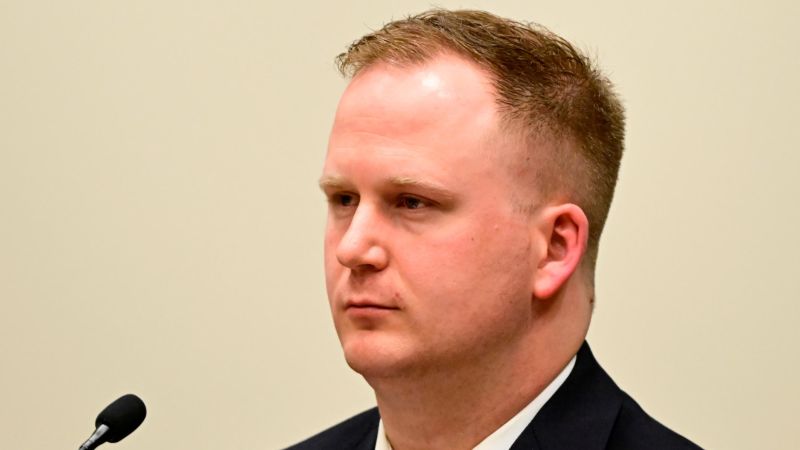


CNN —
One of the officers who arrested Elijah McClain, the unarmed Black man who died after he was restrained by police and injected with ketamine in Aurora, Colorado, in 2019, is set to go on trial Tuesday in the second of three trials related to McClain’s death.
Nathan Woodyard, 34, has pleaded not guilty to reckless manslaughter and a lesser included charge of criminally negligent homicide. Jury selection began on Friday in the case, and opening statements were set to begin Tuesday.
According to the indictment, Woodyard placed McClain in a carotid hold – a move in which an officer uses their biceps and forearm to cut off blood flow to a subject’s brain – that left McClain unconscious. Woodyard then released the hold, and once McClain regained consciousness, he and other officers restrained him on the ground despite his repeated pleas of “I can’t breathe,” according to the indictment.
Woodyard is currently suspended without pay from the Aurora Police Department.
Last week, a Colorado jury delivered a mixed verdict to two other officers involved in the arrest. Randy Roedema, the senior patrol officer on scene who restrained McClain on the ground, was convicted of criminally negligent homicide and assault, while officer Jason Rosenblatt, who attempted an initial unsuccessful carotid hold, was acquitted of all charges.

Rosenblatt was fired by the police department in 2020 and Roedema was initially suspended.
Woodyard’s trial is likely to feature many of the same witnesses and arguments from the trial that just concluded.
The case focuses on the events of August 24, 2019, when officers responded to a call about a “suspicious person” wearing a ski mask, according to the indictment. The officers confronted McClain, a 23-year-old massage therapist, musician and animal lover who was walking home from a convenience store carrying a plastic bag with iced tea. He wore the mask because he was frequently cold, his family has said.
In an interaction captured on body camera footage, police wrestled McClain to the ground and placed him in a carotid hold, and paramedics later injected him with the powerful sedative ketamine. His heart stopped on the way to a hospital, and he was pronounced dead three days later.
Prosecutors initially declined to bring charges, but the case received renewed scrutiny following the nationwide Black Lives Matter protests in spring 2020.
In June 2020, Aurora police and city officials announced changes to police policy, including a ban on carotid holds. Later that month, Colorado Gov. Jared Polis appointed a special prosecutor to reexamine the case, and in 2021 a grand jury indicted three officers and two paramedics in McClain’s death.
Aurora ultimately agreed to pay $15 million to McClain’s family to settle a civil rights lawsuit against the city.
Two paramedics who treated McClain, Jeremy Cooper, 48, and Peter Cichuniec, 50, are set to go on trial in the coming weeks. They have pleaded not guilty to charges of manslaughter and assault.
Roedema and Rosenblatt’s trial began in September and featured testimony from Aurora law enforcement officers who responded to the scene, police training experts and doctors who analyzed how McClain died.
The defense did not call any witnesses, and the two did not testify in their own defense.
The prosecution played body-camera footage of the arrest and said the footage showed officers used excessive force for no reason. McClain repeatedly said he couldn’t breathe, yet the officers did not tell that to anyone on the scene.
The officers “chose force at every opportunity” instead of trying to de-escalate the situation as they’re trained, prosecutor Duane Lyons told the court at closing arguments.
In contrast, Rosenblatt’s attorney, Harvey Steinberg, painted his client as a “scapegoat” and said it’s the paramedics’ responsibility to evaluate a patient’s medical condition. Roedema’s attorney, Don Sisson, said his client’s use of force was justified because McClain resisted arrest. He said McClain had been given 34 commands to either “stop” or “stop fighting.”
The precise cause of McClain’s death was also a key focus of the trial. Prosecutors argued that the police restraint contributed to McClain’s death, while defense attorneys said the paramedics’ decision to inject a large dose of ketamine was to blame.
An initial autopsy report said McClain’s cause of death was “undetermined.” However, an amended report publicly released in 2022 listed “complications of ketamine administration following forcible restraint” as the cause of death.
The mixed verdict for Roedema and Rosenblatt drew split responses.
Sheneen McClain, Elijah McClain’s mother, told CNN affiliate KUSA after the verdict, “This is not justice.” She said Roedema’s guilty verdict is “not enough,” adding the officer was not acting alone in what led to her son’s death.
Colorado Attorney General Phil Weiser said he hoped the verdict can help the community heal.
“Everyone in Colorado, everyone in the United States, no matter who you are, is accountable under the law. Hopefully today’s verdict can be a sign for healing for the Aurora community and for our state,” Weiser said.


